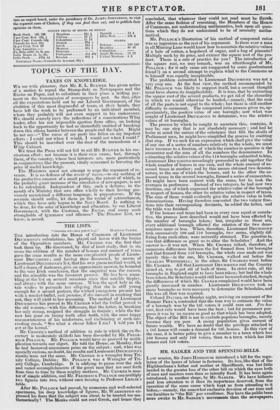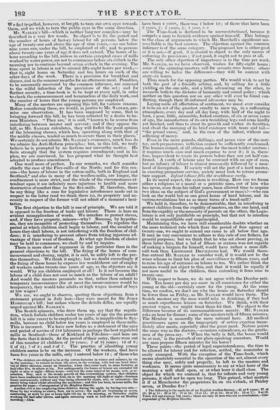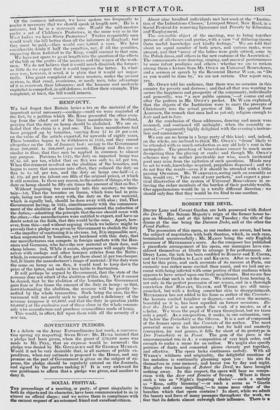MR. SADLER AND THE SPINNING-MILLS.
LAST session, Sir JOHN HOBHOUSE introduced a bill for the regu- lation of the hours of labour in factories. Its loss, like that of the Highlandman's father and mother at Sheriffmuir, was but little heeded in the greater loss of the other bill on which the eyes both of men and masters were then so intently fixed. It has been again introduced, in another shape, by Mr. SADLER. We have hitherto paid less attention to it than its importance deserved, from the operation of the same cause which kept us from attending to it before,—namely, the somewhat exclusive devotion of our time and our faculties to "the Bill "par excellence. Nor have the public been more awake to Mr. SADLER'S movements than the newspapers. e feel iespelled, however, at length to turn our own eyes towards them, and we wish to turn the public eyes in the same direction. Mr. SADLER'S bill—WhiCh is neither long:nor complex—may be llescribed in a very few words. Its object is to fix the period and the number of hours of factory labour for all persons below the age of twenty-one and above the age of nine years,—no one below nine years can, under the bill, be employed at all ; and. to persons above twenty-one years of age it does not extend. The hours of la- bour according to the bill, unless in certain excepted cases of mills worked by water power, are not to commence before six o'clock in the morning nor to continue beyond seven o'clock in the evening. The time spent in labour is not to exceed fifty-eight hours per week,— that is, eight hours on Saturday and ten hours on each of the other days of the week. There is a provision for breakfast and dinner, and in the summer months for an afternoon meal. Penalties, tole summarily recovered by the common informer, are annexed to the wilful infraction of the provisions of the act ; and for further security, a time-book is to be kept at every mill, in order 'to check the commencement and termination of the daily work, and the number of hours that the young persons are employed.. Many of the masters are opposing this bill, for various reasons. Before considering these, we would, in justice to Mr. SADLER, pre- mise one observation. It has been supposed by some, that in bringing forward this bill, he has been actuated by a desire to ha- rass Ministers. "They are," it is said, "known to be averse from interfering between master and servant; and if they oppose the bill, as Mr. SADLER calculates, they will forfeit the good opinion of the labouring classes, which has, operating along with that of the middle classes, tended so much to secure &ern in their places." We certainly do not admire Mr. SADLER'S economics, much less do We admire his Anti-Reform principles; but, in this bill, we truly believe he is prompted by no factious nor unworthy motive. He feels strongly that the system requires amendment; and in his plan, we are convinced, he has proposed what he thought best adapted to produce amendment. One word more of preface. In our remarks, we shall consider chiefly the case of the Flax-mills of the North; and for this rea- son—the hours of labour in the cotton-mills, both in England and Scotland,* and also in many of the woollen-mills, are longer, the confinement is more strict, and the whole of the circumstances at- tendant upon it are infinitely more injurious to health and more destructive of comfort than in the flax-mills. If, therefore, there be any thing like a case for legislative interference made out in respect to the latter (and we think there is), its propriety and ne- cessity in respect of the former will not admit of a moment's hesi- tation.
The first objection to the bill is one of principle. We are told it is opposed to the freedom of trade and labour. There is here an evident misapplication of words. We interfere to protect slaves, and, if they have property, minors—why? Because, by hypothe- sis, they are incapable of protecting themselves. To regulate the period at which children shall begin to labour, and the number of hours they shall labour, is not interfering with the freedom of chil- dren; it is interfering to prevent others from taking injurious ad-. vantage of their want of freedom. At what age freedom of choice may be held to commence, we shall by and by inquire. There is more show of argument in the particular than in the general objections to the bill. The fixing of the hours of com- mencement and closing, might, it is said, be safely left to the par- ties themselves. We think it might; but we doubt exceedingly if the fixing of these hours by express law would throw out of employ all workers under twenty-one years of age, as the objectors say it would. Why are children employed at all? Is it not because the labour of a child does not cost so much as the labour of an adult? And would the masters persuade us that, rather than submit to temporary inconvenience (for at most the inconvenience would be temporary), they would take adults at high wages instead of boys at low wages? We are, we ought to observe, quoting these objections from a statement printed in July last—they were meant for Sir JOHN Honnouse s bill; but unless where the details differ, are equally urged against Mr. SADLER'S. The Scotch spinners, who drew them up, say that the regula- tion, which forbids children under ten years of age (in the present bill it is nine years) to be employed in mills, is inapplicable to flax- mills, because no child below ten years is employed in these mills. This is incorrect. We have now before us a statement of the ages and period of service of 210 labourers in perhaps the best regulated mills in Scotland—those of Kirkland in Fifeshire—and here are the facts that it details. At the period of their entry, there were out of this number 33 children of 10 years; 7 of 9A. years; 18 of 9; 2 of 8:4; 7 of 8; and 3 of 7. The practice of admitting young children seems to be on the increase. Of the workers, that have been five years in the mills, only 1 entered below 10; of those who • The children are obliged to be at the cotton-factories in winter and summer, by six in the morning; to remain in them till seven in the evening, with but one brief inter- val of thirty minutes, except on Saturday, when they cease work in some factories at half after five, in others at six. Not unfrequently the hours of labour are extended till eight or nine at night—fifteen hours—with but the same interval for meals, rest, or re- creation. Nay, such is the steady growth of this overworking system, that children have been eonfinedin the factory from six in the morning tilleight at night—fourteen hours continuously, without any time being allowed for meals, rest, or recreation—the meals being taken whilst attending the machines ; and this has been, in some mills, the practice for years.—Correspondent of the Brighton Gazette. Another evil is the employing these children daring the night, by having two sets,— those by day working us above, from six to seven ; the night set beginning at seven, uontinuing at work by gas or lamp light till six in the morning, on Saturday nights working till half after eleven, .and again resuming work at half after one on Monday morning.r-Iders. have been 4 years, there was 1 below 1.0 ; of those that have been 3 years, 2 ; 2 years, 2 ; 1 year, 8. The Time-book is declared to be unconstitutional, because it compels a man to furnish evidence against himself. This belongs to the class of arguments to which Mr. Burchell's significant mo- nosyllable is the best answer. The objection against the common informer is of the same category. The proposed law is either good or it is not,—if good, it is absurd to object to the only means of enforcing its provisions ; if not good, it ought not to pass at all. The only other objection of importance is to the time per week, Mr. SADLER, as we have observed, wishes for fifty-eight hours ; some of the spinning-masters call for seventy-two hours; others are willing to halve the difference—they will be content with sixty-six hours. Thus much for the opposing parties. We would wish to act by both the part of a friendly arbiter, and, by calling for a little yielding on the one side, and a little advancing on the other, to reconcile both to the dictates of humanity and sound policy ; which neither on this question nor on any other will ever be found con- flicting, though their ill-informed advocates may be. Laying aside all affectation of sentiment, we must ever consider it to be an act of the greatest cruelty to mew up, in a suffocating atmosphere, every day and all day long, with half of the night to boot, a poor, little, miserable, forked creature, of six or seven years of age, the manufacture of its own trembling legs and arms hardly yet finished, and thus to stunt its growth and wither its faculties, and cload. the morning of its brief existence with tears and toil— "the primal curse," and, in the case of the infant, without one softening of mercy. Even in the mere pounds, shillings, and pence view of the mat- ter, such preposterous infliction cannot be sufficiently condemned. The human animal, of all others, asks for the most tender nurture ; it requires much care and much expense to rear it ; it is, there- fore, improvident to waste its powers before they are yet half con- firmed. A youth of labour may be crowned with an age of ease, but an infitncy of labour is almost necessarily- followed by a man- hood of decrepitude. If society will act the part of a hard master, in exacting premature service, society must look to return prema- ture support. Infant labour fills the workhouse early. In its moral aspect, the system is revolting. How can we frame either a religious or a moral or a patriotic man, out of him who has never, even from his infant years, been allowed time to acquire two ideas on the subject of God's government or man's ?—who can look on the world but as one great house of hard labour, and its various revolutions but as so many turns of a tread-mill? We hold it, therefore, to be demonstrable, that in interfering to protect children from the cupidity of masters, on the one hand, and from the cupidity or the necessity of parents on the other, the Legis- lature is not only justifiable on principle, but that not to interfere would be unjustifiable and unprincipled. Maintaining this, we have still considerable doubts whether on the mere technical rule which fixes the period of free agency at twenty-one, we ought to extend our cares to all below that age. It may be very convenient to adhere to this rule of our fathers, for general purposes; but we think that he who set about proving, in these latter days, that a lad of fifteen or sixteen was not capable of making a bargain for himself, would have rather a more diffi- cult task than Lieutenant DRUMMOND had. We would there- fore entreat Mr. SADLER to consider well, if it would not be the wiser scheme to limit his plan of surveillance to fifteen years, and to raise his age of entrance on labour to ten. We rather think the masters would not object to this, and that it would be equally if not more useful to the children, than extending it from nine to twenty-one.
With respect to hours, we do not agree with the Dundee peti- tion. Ten hours per day are enow in all conscience for either the young or the old—certainly enow for the young. At the same time, we confess, we don't see why the hours on Saturday should be fewer than on Friday, as Mr. SADLER would have them. The Scotch masters say the men would take to drinking, if they had so much superfluous leisure on Saturday. We think, with their present wages, we might trust them for that. We object to the difference because of its unreasonableness merely. Mr. SADLER asks an hour for dinner; some of the masters talk of fifteen minutes. The Member is assuredly the more rational here. All medical practitioners agree on the impropriety of active exertion imme- diately after meals, especially after the great meal. Nature points the same way as the doctors,—a curious coincidence, as the gentle- men of the press say. "When the belly is full, the bones would be at rest," is the proverb of our plain-speaking ancestors. Would any man propose fifteen minutes for his horse? These points—the period of legal superintendence, the time to be allowed for labour and for refection, settled, the remainder is easily arranged. With the exception of the Time-book, which seems absolutely essential to the operation of the act, almost every thing else may, safely and properly, be left to the masters and workmen. It seems quite unnecessary to say at what hour of the morning a mill shall open or at what hour it shall close. The object for which we contend is, that for infants and very young persons, it shall not be open too long. This gained, what matters it if at Manchester the proprietors fix. on six o'clock, at Paisley seven, at Dundee five?
The following is the analysis of an English woollen-factory,-41 at 9 years; 97 at 10; 59 at 11 ; 56 at 12 ; 70 at 13; 70 at 14 ; 50 at 15; 28 at 16; 13 at 17; 9 at 19. Total. 475 and average 121 years ; there are only 16 men who act as overlookers.—Cor• respondent of the Brighton Gazette. • Of the common informer, we have spoken too frequently to render it necessary that we should speak at length now. He is a nuisance, but he is a necessary one. Would the mill-masters prefer a set of Children's Protectors, in the same way as in the West Indies we have Slave Protectors? Twelve respectable men would work the bill better than all the informers in England; but they must be paid,—they would cost 6,000/. a year. We have considerable doubt if half the penalties, nay, if all the penalties, supposing them forfeited to the King, would amount to that sum. We have not space to go at length into the question of the effects of the bill on the profits of the masters and the wages of the work- men. We do not believe that it would much diminish the former; as little do we expect that it would improve the latter. In what- ever way, however, it acted, it is plain that it would net impar- tially. One great complaint of many masters, under the present system, is, that cruel, avaricious, or needy men, take advantage of it to overwork their labourers; and the humane and moderate capitalist is compelled, in selfsdefence, to follow their example. This complaint, at least, the bill would remove.




























 Previous page
Previous page